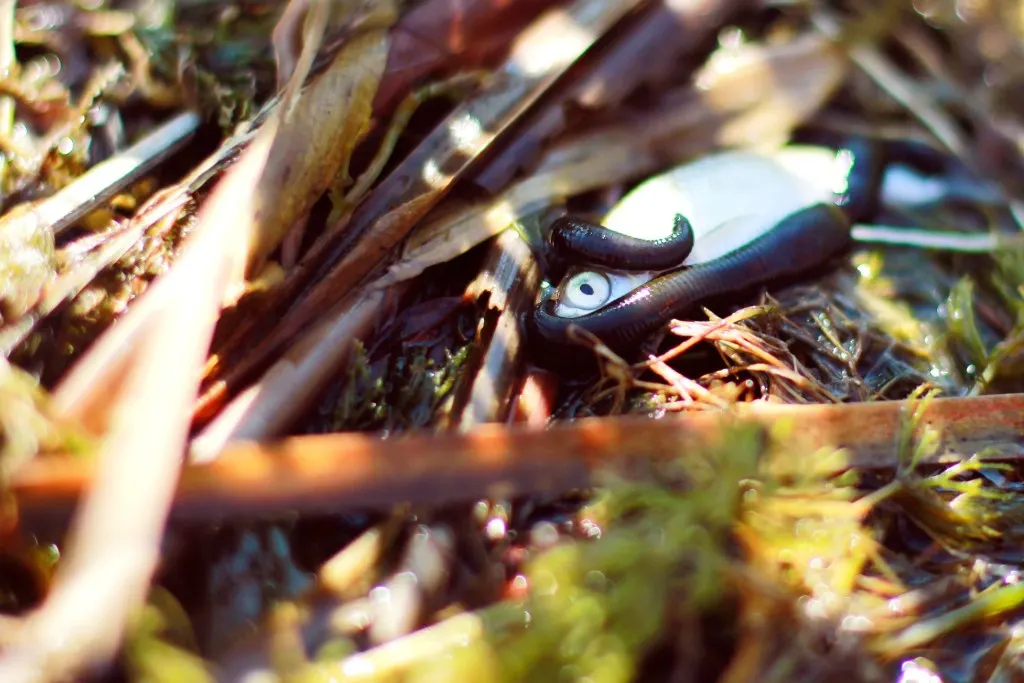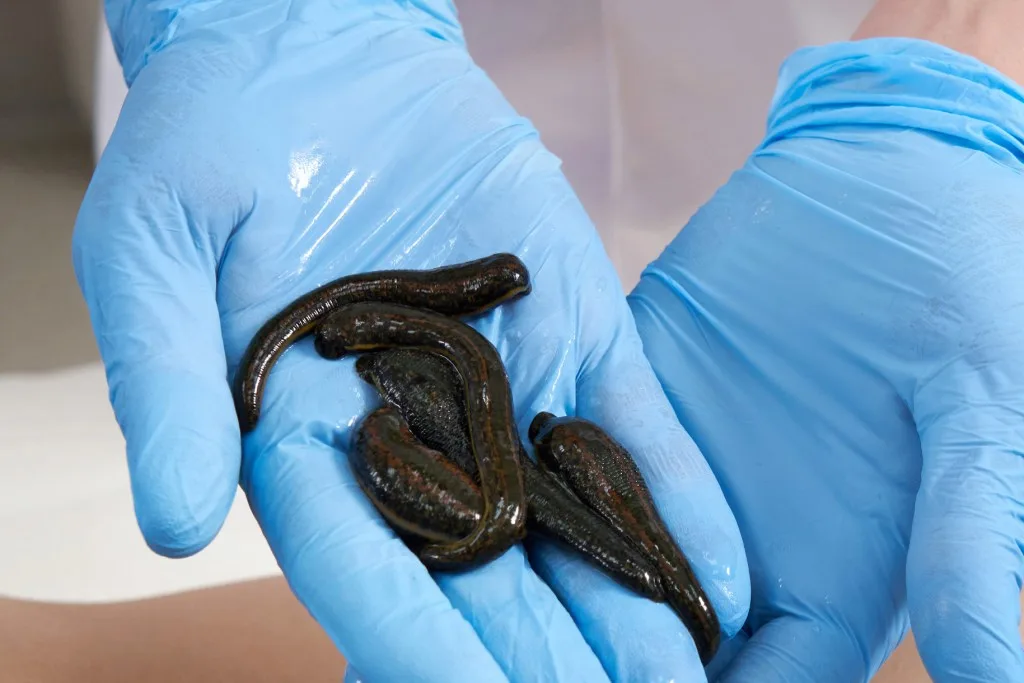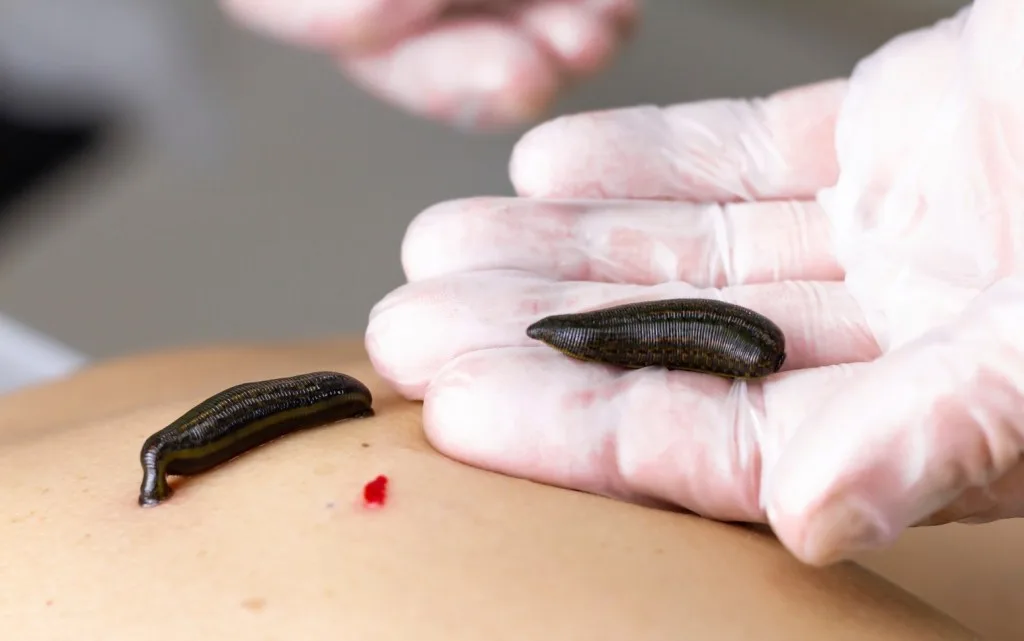If you go for a dip in a lake or stream, you may be in for an unfortunate surprise. Parasites hang out in shallow waters and often hide in plants, under rocks, and other debris in the water. It can be easy to worry if you find a leech has attached itself to you.
But are leeches harmful to humans?
Today, we’re looking at these parasites, what you should do if you have an encounter with one, and how serious you should take it. Let’s dive in!
What Are Leeches?
Leeches are in the same family as earthworms (oligochaetes) and have segmented bodies that are soft and muscular. They can lengthen and contract their bodies, and both ends of their bodies contain suckers. Most leeches live in freshwater, but you’ll also find them in saltwater and out of water. Approximately three-quarters of them feed off blood from a host. The remaining quarter is made up of predators that will hunt for their food.
Until the 19th century, leeches were commonly used in medicine to draw blood from patients. While we found safer and more effective ways of drawing blood, leeches are still commonly used to help treat diseases like epicondylitis and osteoarthritis.
With over 680 different leech species, you can find them practically everywhere on the planet. Sadly, the only place where you’re safe from leeches is Antarctica. So unless you’re in Antarctica, it’s worth keeping an eye out for them.

What Attracts Leeches to Humans?
Leeches typically seek out humans due to the disturbances they create in the water, their body heat, and the oils and sweat on their skin. These curious creatures find spots to hide in the shallow waters and enjoy the dark.
However, splashing and swimming will excite them and spur their curiosity to check out who or what is making the disturbance in the water.
Pro Tip: Avoid leeches by avoiding these Most Dangerous Rivers in the USA.
How Long Do Leeches Live?
While many parasites have a relatively short lifespan, leeches live much longer than you’d expect. Eggs take approximately two weeks to hatch, and within a year, they reach maturity and begin reproducing. A typical leech will live anywhere from two to eight years.

Can Leeches Survive Out of Water?
While most leeches live in water, they can be very resistant during dry periods or droughts. They will bury themselves in the mud and can lose 90% of their body capacity and still survive. Some spend their entire lives out of water. However, these particular leeches typically live in very moist environments.
You may think that they will struggle to breathe outside of water. However, they may live in the water, but they don’t have gills or lungs. Instead, leeches breathe through their skin.
Are Leeches Harmful to Humans?
A vast majority of the time, leeches pose little to no harm to humans. Their bites may result in a generous amount of blood, but only because their saliva is an anticoagulant. Their saliva makes it difficult for clotting to occur in humans.
There’s the potential that a bite from a leech can lead to an infection or even disease. Although the chances are very rare, a leech can carry Hepatitis B, Malaria, or even HIV. There’s also the potential that a human could get an abundance of leech bites and bleed to death.

What Do You Do When a Leech Bites You?
While leeches pose very little threat to humans, the biggest risk is improperly removing them. If not done correctly, the leech could throw up while detaching from you and transfer harmful bacteria that could transmit an infection or a disease.
If a leech is actively biting you, look for the leech’s sucker/mouth. You can typically identify this quickly by finding the narrower end of the leech. Take a flat or blunt object like a credit card or driver’s license and slide the object’s edge between the leech’s sucker and your skin. Repeat the process to the other end of the leech and toss it as far as you can.
Once you rid yourself of any leeches, clean the bite area with soapy water. Use clean water and an antiseptic to get the area clean. Dry the area and apply peroxide. The peroxide can counteract the effects of the saliva’s anticoagulant characteristics.
Pro Tip: Cockroaches, leeches, mosquitos, oh my! Keep your RV bug free by using these tips on how to Keep Those Dang Bugs Out Of Your RV.
What Keeps Leeches Away?
If you want to keep leeches away, you can do a few things. One of the best methods is to use eucalyptus oils, insect repellents, and vinegar. If you go the insect repellent route, DEET products are typically some of the best options.
You can also protect yourself by wearing long pants and shirts, staying out of the water, and covering any potentially exposed skin. You can even buy anti-leech socks to keep leeches off you during your adventures.
Have you ever had an encounter with leeches while on an adventure? What’s your best method for keeping leeches off of you? Tell us in the comments!
Discover the Best Free Camping Across the USA
To be honest with you, we hate paying for camping. There are so many free campsites in America (with complete privacy).
You should give it a try!
As a matter of fact, these free campsites are yours. Every time you pay federal taxes, you’re contributing to these lands.
Become a FREE CAMPING INSIDER and join the 100,000 campers that love to score the best site!
We’ll send you the 50 Best Free Campsites in the USA (one per state). Access the list by submitting your email below: